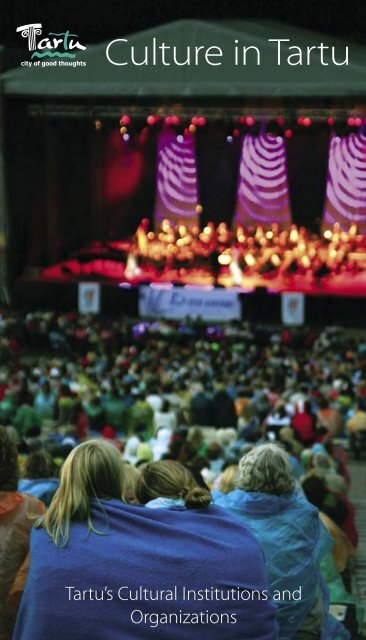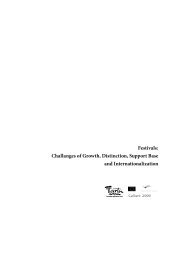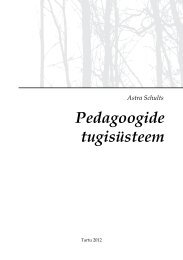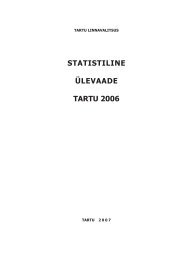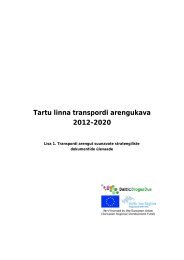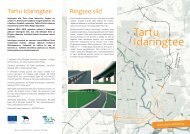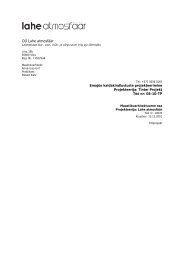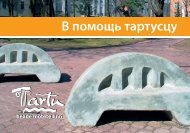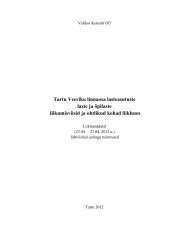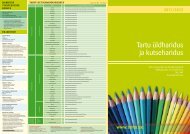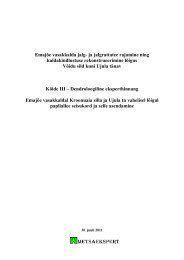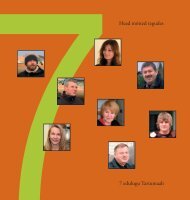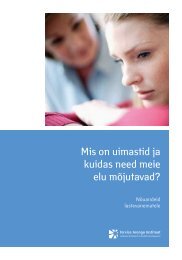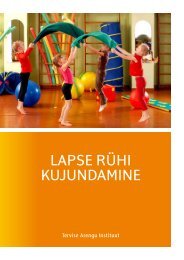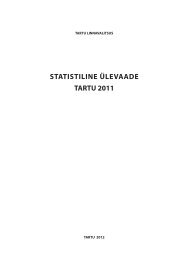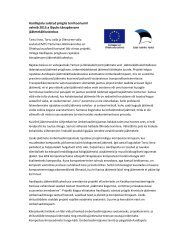Tartu's cultural institutions and organisations
Tartu's cultural institutions and organisations
Tartu's cultural institutions and organisations
Create successful ePaper yourself
Turn your PDF publications into a flip-book with our unique Google optimized e-Paper software.
Culture in Tartu<br />
Tartu’s Cultural Institutions <strong>and</strong><br />
Organizations
1<br />
Culture in Tartu<br />
Culture in Tartu<br />
Tartu City Government Department of Culture... 2<br />
Cultural Service ............................................................... 4<br />
Youth Policy Service ...................................................... 6<br />
Sports Service .................................................................. 7<br />
Tartu Kultuuriaken ......................................................... 8<br />
Tartu’s Cultural Institutions <strong>and</strong> Organizations<br />
Museums ........................................................................... 10<br />
Concert Venues ............................................................... 21<br />
Theatres.............................................................................. 23<br />
Galleries <strong>and</strong> Art Shops................................................ 24<br />
Cinema................................................................................ 25<br />
Libraries.............................................................................. 26<br />
Hobby Education Schools........................................... 28<br />
Cultural Institutions <strong>and</strong> Organizations................ 29<br />
Youth Centres of the City of Tartu............................ 36<br />
Sports Facilities................................................................ 39<br />
The development of Tartu as a <strong>cultural</strong> city has in<br />
many ways been guided by the development field<br />
lines of the European culture. For centuries, Tartu<br />
has been the pioneer of Estonian culture. Common<br />
knowledge includes the facts that this is the birth<br />
place of the Estonian national university <strong>and</strong> the first<br />
professional theatres. Tartu has been awarded the<br />
UNICEF’s title of a Child Friendly City, <strong>and</strong> values <strong>and</strong><br />
acknowledges its creative persons – Tartu has plenty<br />
of opportunities for professional <strong>cultural</strong> self-actualization.<br />
The city is also home to hundreds of hobby<br />
collectives <strong>and</strong> associations (choirs; dance groups,<br />
clubs <strong>and</strong> studios; sports clubs, youth centres <strong>and</strong><br />
organizations; various ensembles <strong>and</strong> folk <strong>cultural</strong><br />
associations).<br />
About 4 000 different major <strong>and</strong> minor events take<br />
place in Tartu during one year. The biggest of the image<br />
events with established traditions are the Drama<br />
Festival, the Tartu Prima Vista Literature Festival, the<br />
Tartu Student Days <strong>and</strong> the Hanseatic Days. In sports,<br />
the biggest undertaking is the quadruple event that<br />
consist of the bicycle marathon <strong>and</strong> race, the running<br />
marathon <strong>and</strong> the skiing marathon.<br />
Compiled by Tartu City Government Department of Culture<br />
Design by OÜ Disain ja Trükk<br />
Photos by Meelis Lokk, Aavo Kaine, Ingrid Leinus, Aldo Luud,<br />
Alar Madisson, Alan Proosa, Rein Toom, Mart Velsker, Tiina Viirelaid<br />
Printed by AS Paar
2 3<br />
Tartu City Government Department of Culture<br />
Tartu<br />
City Government<br />
Department of<br />
Culture<br />
Raekoja plats 12<br />
Tartu<br />
) +372 736 1360<br />
Tartu’s <strong>cultural</strong> life relies on traditions, openness <strong>and</strong><br />
development, guaranteeing the environment for creating,<br />
consuming <strong>and</strong> transmitting culture. The primary<br />
task of the city in the field of culture is to create<br />
a safe, developing <strong>and</strong> modern working environment<br />
for the <strong>cultural</strong> <strong>institutions</strong> <strong>and</strong> <strong>cultural</strong> workers.<br />
Both creativity <strong>and</strong> ambitious ideas require the presence<br />
of strong <strong>and</strong> original creative persons. Tartu<br />
as a city of science, education <strong>and</strong> culture has great<br />
prerequisites for becoming a celebrated creative European<br />
town. International cooperation contributes<br />
significantly to outlining Tartu’s values <strong>and</strong> opening<br />
the city’s potential.<br />
The development strategy Tartu 2012 sees Tartu as<br />
a city of unique festivals, song festivals <strong>and</strong> sports<br />
events. Due to the large proportion of students among<br />
the city’s <strong>cultural</strong> consumers, Tartu can also be considered<br />
a hotbed of <strong>cultural</strong> consumption skill development<br />
<strong>and</strong> this influence spreads all over Estonia.<br />
For Tartu, the priority aspects are the openness to new<br />
ideas <strong>and</strong> creating contacts; crossing the field borders<br />
<strong>and</strong> cooperating with the people from other fields;<br />
interactivity <strong>and</strong> contact with the audience; knowing<br />
one’s target groups <strong>and</strong> engaging them in a dialogue.<br />
The Department of Culture led the creation of the<br />
<strong>cultural</strong> <strong>and</strong> sports development plan for the years<br />
2004-2007 in Tartu. The development plan gives<br />
an in-depth overview of the future vision in the<br />
field of culture <strong>and</strong> sports <strong>and</strong> establishes the main<br />
activities <strong>and</strong> goals for the Department of Culture<br />
in the coming years. The development plan is available<br />
at the Department of Culture’s homepage at<br />
www.tartu.ee/kultuuriosakond.<br />
Once a year, the Tartu City Government Department<br />
of Culture accepts requests for money, supporting<br />
the <strong>cultural</strong>, sports <strong>and</strong> youth projects <strong>and</strong> organizations<br />
from the city’s budget for the next year. Another<br />
tradition is the annual award<br />
ceremony for the city’s best<br />
in the fields of culture, sports<br />
<strong>and</strong> youth affairs.<br />
The Department of Culture<br />
consists of the Cultural,<br />
Sports <strong>and</strong> Youth Policy Services.<br />
Ten municipal <strong>institutions</strong><br />
work under the Department<br />
of Culture: the Anne<br />
Youth Centre, the Children<br />
<strong>and</strong> Youth Centre “Lille Maja”,<br />
the Tartu Public Library, the<br />
Tartu I Music School, the<br />
Tartu II Music School, the<br />
Tartu Art School for Children,<br />
the Tartu City Sports Bases,<br />
the Tartu City Museum, the<br />
Tartu Toy Museum, <strong>and</strong> the<br />
Tiigi Community Centre.<br />
Tartu I<br />
Music<br />
School<br />
Anne<br />
Youth Centre<br />
Tartu City Government<br />
Department of Culture<br />
Youth<br />
Policy<br />
Service<br />
Tartu<br />
Toy<br />
Museum<br />
Tartu City<br />
Sports Bases<br />
Cultural<br />
Policy<br />
Service<br />
Tartu Art<br />
School<br />
for Children<br />
Tartu<br />
Public<br />
Library<br />
Tartu<br />
City<br />
Museum<br />
Tiigi<br />
Community<br />
Centre<br />
Sports<br />
Policy<br />
Service<br />
Tartu II<br />
Music<br />
School<br />
Youth Centre<br />
“Lille Maja”<br />
www.tartu.ee/kultuuriosakond
4 5<br />
Cultural Service<br />
The Cultural Service task is the coordination of the<br />
city’s <strong>cultural</strong> life – supporting <strong>cultural</strong> events <strong>and</strong> activities;<br />
checking the purposeful usage of the support<br />
sums; initiating <strong>and</strong> managing local <strong>and</strong> international<br />
cooperation projects; developing <strong>cultural</strong> development<br />
plans <strong>and</strong> strategies together with the various<br />
<strong>cultural</strong> organizers.<br />
The Service also deals with acquiring information<br />
about program participation <strong>and</strong> support opportunities;<br />
systematizing the existing information; arranging<br />
information days, <strong>and</strong> managing the <strong>cultural</strong><br />
information mailing list. In order to get an overview<br />
of the <strong>cultural</strong> life, the Service collects <strong>and</strong> analyzes<br />
the statistical data concerning culture in Tartu <strong>and</strong><br />
compares the different models of <strong>cultural</strong> work organization<br />
in the modern world.<br />
The Cultural Service acknowledges the creative persons<br />
<strong>and</strong> <strong>institutions</strong> related to culture by issuing the<br />
annual honorary <strong>cultural</strong> title, the “Culture Carrier”, a<br />
prize that also features monetary awards.<br />
The best overview of Tartu’s <strong>cultural</strong> events is given by<br />
the online <strong>cultural</strong> database at kultuuriaken.tartu.ee.<br />
The Department of Culture also leads the publication<br />
of the <strong>cultural</strong> calendar that is issued four times a year<br />
<strong>and</strong> describes Tartu’s <strong>cultural</strong> events.<br />
Of the projects related to culture, the most support<br />
during the years has been given to image events, the<br />
more detailed list of which is included in the <strong>cultural</strong><br />
<strong>and</strong> sports development plan for 2004-2007 in Tartu.<br />
Support is also given to the projects related to the<br />
state holidays <strong>and</strong> folk calendar events; folk <strong>cultural</strong><br />
projects; international <strong>cultural</strong> exchange, exhibitions<br />
<strong>and</strong> concerts; theatre <strong>and</strong> literature projects.<br />
ties for joining the pan-European networks <strong>and</strong> for<br />
creative cooperation with colleagues from other<br />
European countries. Taking the <strong>cultural</strong> organizers’<br />
skills <strong>and</strong> knowledge to an international level is a<br />
significant goal that the Tartu City Government supports<br />
through the organization of various courses,<br />
seminars <strong>and</strong> conferences.<br />
Among the international projects the Cultural Service<br />
initiated a series of <strong>cultural</strong> conferences <strong>and</strong> by today<br />
has organized already 2 conferences. Other notable<br />
achievements include the creation of the <strong>cultural</strong><br />
marketing strategy of Tartu <strong>and</strong> the 3 issues of “Idea<br />
Market”, an article collection focusing on <strong>cultural</strong><br />
marketing.<br />
A more in-depth overview of the Cultural Service<br />
activities is available at the Cultural Service website:<br />
www.tartu.ee/kultuuriteenistus<br />
For years, the Cultural Service has written <strong>and</strong> managed<br />
international projects to exchange experiences<br />
<strong>and</strong> to train local <strong>cultural</strong> operators. The Cultural<br />
Services helps the city’s <strong>cultural</strong> persons to develop<br />
their mutual cooperation, creates them opportuniwww.tartu.ee/kultuuriteenistus
6 7<br />
Youth Policy Service<br />
Sports Service<br />
The goal of the Youth Policy Service is to plan <strong>and</strong> organize<br />
Tartu’s youth policy work; to initiate <strong>and</strong> manage<br />
international <strong>and</strong> local projects; to plan budget<br />
resources for supporting youth events, to open youth<br />
centres <strong>and</strong> hobby clubs, <strong>and</strong> to sign contracts with<br />
the supported parties.<br />
The Service’s cooperation partners in organizing<br />
youth work include several associations from the nonprofit<br />
sector, <strong>and</strong> the city’s youth policy <strong>institutions</strong>.<br />
Cooperation with the partners from Tartu’s twin cities<br />
is also active.<br />
In order to plan developments in youth policy, the<br />
Youth Policy Service organizes <strong>and</strong> analyzes youth<br />
studies for a better underst<strong>and</strong>ing of young people.<br />
The Service also coordinates the summer vacation for<br />
youngsters <strong>and</strong> trains youth workers <strong>and</strong> leaders.<br />
Support is given to youth projects; youth centres managed<br />
by the NGO sector; <strong>and</strong> youth hobby clubs (with<br />
per capita fees). The preference in youth event support<br />
from the city budget is given to the projects that have<br />
been initiated by the youngsters themselves <strong>and</strong> that<br />
deal with social, health <strong>and</strong> <strong>cultural</strong> issues.<br />
Every December, the youth policy field gala looks back<br />
at the successes of last year <strong>and</strong> acknowledges the significant<br />
achievers in seven different categories.<br />
The best overview of Tartu’s youth events is given by<br />
the online <strong>cultural</strong> database at noorteaken.tartu.ee.<br />
In the long-term perspective, the basic document for<br />
the youth policy activity in Tartu is the youth policy<br />
development trend <strong>and</strong> action plan for 2004-2007,<br />
passed by the Tartu City Council.<br />
A more in-depth overview of the Youth Service<br />
activities is available at the Youth Service website:<br />
www.tartu.ee/noorsooteenistus<br />
The goal of the Sports Service is to create conditions<br />
<strong>and</strong> opportunities for the citizen groups in Tartu<br />
with varying needs in order to realize their interest<br />
in sport.<br />
The main tasks are the compilation <strong>and</strong> execution<br />
of sport-related activity development programs;<br />
the consultation <strong>and</strong> support of sports associations,<br />
clubs <strong>and</strong> private schools; the analysis <strong>and</strong> processing<br />
of presented sports projects; making suggestions to<br />
the City Government; <strong>and</strong> compiling budget projects.<br />
The Sports Service also deals with the support of children’s<br />
<strong>and</strong> youth sport activities <strong>and</strong> the co-financing<br />
of the preparation of top athletes.<br />
The Sports Service compiles the sports event calendar<br />
plan <strong>and</strong> communicates with the twin cities.<br />
Cooperation exists with the Tartu Sports Association<br />
<strong>and</strong> various state sports sub-associations.<br />
Much of the support to the field of sports goes to<br />
financing the children’s <strong>and</strong> youth sporting activities.<br />
Other supported activities include the various<br />
sports-related projects <strong>and</strong> events that are divided<br />
into image events, traditional events <strong>and</strong> national<br />
sports events. Support is also available for professional<br />
athletes who wish to participate in national<br />
<strong>and</strong> international title competitions. A separate part<br />
of the support is given to the sports facilities owned<br />
by the City of Tartu in order to provide youngsters<br />
with conveniently priced opportunities for practice.<br />
Once a year the Sports Service organizes an acknowledgement<br />
of the best athletes. The honorary sports<br />
titles of Tartu are the city’s recognition of its athletes,<br />
teams <strong>and</strong> coaches who have achieved outst<strong>and</strong>ing<br />
sporting results during the year.<br />
A more in-depth overview of the Sports Service<br />
activities is available at the Sports Service website:<br />
www.tartu.ee/sporditeenistus<br />
www.tartu.ee/noorsooteenistus<br />
www.tartu.ee/sporditeenistus
8 9<br />
Tartu Kultuuriaken<br />
Tartu’s Cultural Institutions <strong>and</strong> Organizations<br />
Since the fall of 2005, the public database<br />
“Kultuuriaken” (literally: “the<br />
Cultural Window”) has a new <strong>and</strong> more<br />
user-friendly design to disseminate<br />
Tartu’s <strong>cultural</strong> information more comfortably.<br />
We believe that this will help<br />
both Tartu’s inhabitants <strong>and</strong> guests to<br />
navigate better in the city’s ever more<br />
diverse <strong>cultural</strong> life. The database is<br />
meant for everyone who wants to<br />
know <strong>and</strong> announce the events in Tartu’s<br />
<strong>cultural</strong>, youth <strong>and</strong> sports life.<br />
“Kultuuriaken” is constantly updated by the active users: they<br />
are the ones who make kultuuriaken.tartu.ee such a good<br />
source of information. Event organizers, hobby clubs, entertainment<br />
locations <strong>and</strong> everyone else offering a chance to<br />
spend free time in Tartu is welcome to add information about<br />
their activities to the database. Use of “Kultuuriaken” <strong>and</strong> information<br />
submission is both free of charge.<br />
“Kultuuriaken”, which is administrated by the Tartu City Government<br />
Department of Culture, has been successfully active since<br />
2001 <strong>and</strong> today the database receives over 10 000 visitors per<br />
week. In addition to the event previews, the “Kultuuriaken” sections<br />
“Tegijad” (“Doers”) <strong>and</strong> “Kohad” (“Venues”) also offer information<br />
about event organizers <strong>and</strong> venues <strong>and</strong> many hobby<br />
activity <strong>and</strong> training organizers.<br />
Currently over 450 organizations – ensembles, aerobics groups,<br />
youth centres, associations etc – have registered themselves<br />
in the “Tegijad” section. The registered “Kultuuriaken” user can<br />
change <strong>and</strong> update the entered data card or the information<br />
about the event. The user can also order the personal newsletter<br />
about the events added to “Kultuuriaken” to his or her e-mail<br />
address. The subscriber can select the categories of the events<br />
<strong>and</strong> the frequency of the newsletter. Already over 200 venues<br />
for events, concerts, training sessions etc have been added to<br />
“Kultuuriaken”. A total of over 12 000 entries about events have<br />
been made to “Kultuuriaken” in the 4 years.<br />
The section “Uudised” (“News”) lets the user find <strong>cultural</strong><br />
information – this is where the database shows the announcements<br />
by the Tartu City Government Department of<br />
Culture, the city’s <strong>cultural</strong> information <strong>and</strong> the mailing lists<br />
of kultuur.teated. The users can also add classified ads to the<br />
“Teadetetahvel” (“Notice Board”) <strong>and</strong> start new threads in the<br />
forum about Tartu’s <strong>cultural</strong> life.
10 11<br />
Museums<br />
Municipal Museums<br />
Tartu City Museum<br />
Tue-Sun 11-18<br />
phone +372 746 1911<br />
Narva mnt 23<br />
linnamuuseum.tartu.ee<br />
The Tartu City Museum was established in 1955 for<br />
collecting, studying <strong>and</strong> displaying the objects connected<br />
with the city history. The museum organizes<br />
annual Tartu History Days <strong>and</strong> international Hanseatic<br />
Conferences. Since 1995, the Museum publishes its<br />
own yearbook. In 2001, the Museum opened the permanent<br />
exhibition “Dorpat, Yuryev, Tartu” – one possible<br />
interpretation of the city’s history. The permanent<br />
exhibition is complemented by topical exhibitions<br />
<strong>and</strong> pedagogic programs.<br />
19th Century Tartu Citizen’s Home Museum<br />
Wed-Sun<br />
from April to September 11-18<br />
from October to March 10-15<br />
phone +372 736 1545<br />
Jaani 16<br />
The 19th Century Tartu Citizen’s Home Museum is<br />
located in one of the city’s oldest wooden buildings<br />
at Jaani street 16. When the visitor enters the house,<br />
he or she will find him/herself in the 1830s home of<br />
a middle class German family. Looking around, one<br />
can see the living room, dining room, bedroom <strong>and</strong><br />
kitchen, decorated in the Biedermeier style characteristic<br />
of the II quarter of the 19th century.<br />
Karl Ristikivi Museum<br />
Mon, Wed, Sat 12-16<br />
phone +372 746 1050<br />
Karl August Hermanni 18<br />
The apartment-museum of Karl Ristikivi was opened<br />
in the Tähtvere district of Tartu in 1991. The museum<br />
is in the Hermanni street 18 house where the writer<br />
lived between 1936-1943 <strong>and</strong> describes the life <strong>and</strong><br />
works of the writer who lived in exile since 1943. The<br />
museum is also a chance to get acquainted with exile<br />
literature. Every year, the writer’s birthday on October<br />
16 is the Ristikivi Day (with presentations about Estonian<br />
emigrant literature etc).<br />
House Museum of Oskar Luts<br />
Wed-Sat 11-17, Sun 13-17<br />
phone +372 746 1030<br />
Riia 38<br />
The House Museum of Oskar Luts was opened in 1964<br />
in the small Riia street house with a dormer floor that<br />
the writer had commissioned in 1936 according to<br />
the design by the legendary architect Matteus. Oskar<br />
Luts (1887-1953), a man whose name still has significance<br />
for Estonians, lived here for the last 17 years of<br />
his life. The permanent exhibition gives an overview<br />
of his life <strong>and</strong> work. Group tours can see performances<br />
of the writer’s works along with the dramatic<br />
recreations <strong>and</strong> museum lessons led by the instructor.<br />
During spring, the Museum garden hosts children’s<br />
<strong>and</strong> youth music, theatre, art <strong>and</strong> poetry events. The<br />
Museum’s archives are open to researchers.<br />
KGB Cells<br />
Tue-Sat 11-16<br />
phone +372 746 1717<br />
Riia 15B<br />
The KGB Cells Museum is located in the “Grey House”<br />
that in the 1940-50s housed the NKVD/KGB’s Tartu<br />
Office. The visitors can see the building’s basement<br />
that held arrest cells <strong>and</strong> solitary confinement cells.<br />
Some cells have been restored to their original state,<br />
others are filled with the exhibition of the Estonian<br />
resistance movement history <strong>and</strong> the crimes of Communism.
12 13<br />
National Museums<br />
Tartu Toy Museum<br />
Wed-Sun 11-18<br />
phone +372 746 1777<br />
Lutsu 8<br />
www.mm.ee<br />
The Toy Museum is located in the centre of Tartu’s<br />
Old Town in an old wooden building <strong>and</strong> gives the<br />
adults a chance to go back into their childhood,<br />
<strong>and</strong> the children the chance to relate to dolls in a<br />
different way. A permanent exhibition of dolls <strong>and</strong><br />
toys throughout the ages is complemented by the<br />
playing <strong>and</strong> h<strong>and</strong>icraft room; <strong>and</strong> also temporary<br />
exhibitions, courses <strong>and</strong> children’s events.<br />
Cinema <strong>and</strong> Theatre Puppet House<br />
of the Tartu Toy Museum<br />
Wed-Sun 11-18<br />
phone +372 746 1778<br />
Lutsu 8<br />
www.mm.ee<br />
The Cinema <strong>and</strong> Theatre Puppet House of the<br />
Toy Museum displays the puppets <strong>and</strong> props of<br />
the Estonian animated movies made in the last<br />
half a century. There is also an introduction into<br />
the puppet theatre history; a chance to see animated<br />
cartoons; a view into the process of theatre<br />
puppet production; an overview of the technical<br />
predecessors to the current cinema; <strong>and</strong> the<br />
chance to test some of the simpler optical tricks.<br />
Tartu Art Museum<br />
Wed-Sun 11-18<br />
phone +372 744 1080, +372 744 1920<br />
Raekoja plats 18<br />
www.tartmus.ee<br />
The Tartu Art Museum was opened in 1940 <strong>and</strong> today<br />
has one of Estonia’s finest art collections of painted,<br />
graphic, sculpted <strong>and</strong> multimedia works from mostly<br />
Estonian, but also Russian <strong>and</strong> Western European artists.<br />
The art fans can also peruse the art history archive,<br />
film <strong>and</strong> photo collection, <strong>and</strong> library. The Leaning<br />
House by the Town Hall Square hosts over 10 different<br />
exhibition projects during a year <strong>and</strong> the accompanying<br />
lectures <strong>and</strong> practical activities are organized by<br />
the education centre. The traditional exhibition “The<br />
Tales of Tartu’s Art”, already the eighth permanent exhibition,<br />
introduces the city’s art development history<br />
through the one <strong>and</strong> a half century of the artists <strong>and</strong><br />
groups who studied, taught or were active in Tartu.<br />
Estonian Literary Museum<br />
Mon-Thu 9-17, Fri 9-16.30<br />
phone +372 737 7700<br />
Vanemuise 42<br />
www.kirmus.ee<br />
The Estonian Literary Museum is a national scientific<br />
<strong>and</strong> development institution administrated by the<br />
Ministry of Education <strong>and</strong> Research, that also works<br />
as the central archive of national literature <strong>and</strong> folklore,<br />
<strong>and</strong> the national archive library. The main goal of<br />
the Literary Museum is to guarantee the preservation<br />
of national <strong>cultural</strong> source materials necessary for the<br />
continuation of the national identity <strong>and</strong> the social<br />
memory, intellectual freedom <strong>and</strong> the wholesome<br />
<strong>cultural</strong> development; <strong>and</strong> also to conduct research<br />
<strong>and</strong> communication according to the scientific community’s<br />
<strong>and</strong> society’s needs <strong>and</strong> interests.<br />
The Literary Museum has six subsections: the Archival<br />
Library, the Estonian Folklore Archives, the Estonian<br />
Cultural History Archives, the Department of Folklore,<br />
the Department of Ethnomusicology, <strong>and</strong> the Administrative<br />
Department. The three structural units manage<br />
the large, unique folk <strong>cultural</strong> collections: the<br />
national heritage collection, the <strong>cultural</strong> historical<br />
source material collection, the folklore collection.
14 15<br />
Estonian National Museum<br />
Wed-Sun 11-18<br />
phone +372 742 1311, +372 742 2266<br />
Julius Kuperjanovi 9<br />
www.erm.ee<br />
The Estonian National Museum was founded in 1909<br />
to preserve the memory of Jakob Hurt, our biggest collector<br />
of old items, <strong>and</strong> to foster Estonian folklore research.<br />
During the first years of the museum, the main<br />
focus was on preserving the fading old peasant culture.<br />
Today, the main task of the Estonian National Museum<br />
is to form a complete picture of Estonian culture <strong>and</strong><br />
to help preserve our national identity. The Museum<br />
deals mainly with collecting, preserving, studying<br />
<strong>and</strong> introducing the materials that reflect primarily<br />
Estonian culture, but also the culture of other Finno-<br />
Ugric peoples <strong>and</strong> the minorities living in Estonia. The<br />
Estonian National Museum is Estonia’s most important<br />
ethnological centre <strong>and</strong>, for a long time, was also one<br />
of the symbols of the Estonian people.<br />
Estonian Sports Museum<br />
Wed-Sun 11-18<br />
phone +372 730 0750<br />
Rüütli 15<br />
www.spordimuuseum.ee<br />
Estonia’s only sports museum, the largest in the<br />
Baltic States, is located in Tartu. The Estonian Sports<br />
Museum is one of the national central museums <strong>and</strong><br />
its goal is to collect, preserve, study <strong>and</strong> introduce the<br />
materials related to Estonia’s athletics <strong>and</strong> sports. The<br />
Sports Museum features an interactive permanent<br />
exhibition “Hortus Athleticus” <strong>and</strong> also constantly<br />
organizes temporary exhibitions, conferences, information<br />
days, children’s events etc. During workdays,<br />
the sports fans can peruse the sports library.<br />
Estonian Agri<strong>cultural</strong> Museum<br />
Mon-Sun 9-18,<br />
phone +372 738 3810<br />
Pargi 4, Ülenurme<br />
www.epm.ee<br />
The Estonian Agri<strong>cultural</strong> Museum was founded in<br />
1968 <strong>and</strong> is located in the buildings of the former<br />
Ülenurme Manor in Tartu County. The museum’s permanent<br />
exhibitions give an overview of the Estonian<br />
peasant’s l<strong>and</strong> cultivation, sowing practices, harvest,<br />
animal husb<strong>and</strong>ry, flax growing <strong>and</strong> apiculture. The<br />
Agri<strong>cultural</strong> Museum also hosts temporary exhibitions<br />
of the rural life <strong>and</strong> home, <strong>and</strong> offers a chance<br />
to participate in various workshops <strong>and</strong> children’s<br />
programs. The amphitheatre is home to the thoroughbred<br />
displays, theatre performances, concerts<br />
<strong>and</strong> other events.<br />
Museum of Tartu County<br />
Mon-Fri 10-17, Sat 10-15<br />
phone +372 745 6141<br />
Pikk 2, Elva<br />
www.tartumaamuuseum.ee<br />
The Museum of Tartu County was established in 1959<br />
as the national county museum. The Museum’s goal<br />
is to study, preserve <strong>and</strong> introduce the nature, culture<br />
<strong>and</strong> history of the Old Tartu County through exhibitions,<br />
programs <strong>and</strong> events. The Museum is also<br />
tasked with leading the county’s minor museums.<br />
The Museum of Tartu County is located in Elva.
16 17<br />
Tartu University Museums<br />
Tartu University Art Museum<br />
Mon-Fri 11-17, Sat-Sun with prior notice<br />
phone +372 737 5384<br />
Ülikooli 18<br />
www.ut.ee/artmuseum<br />
The Estonia’s oldest museum (active for over 200<br />
years) has preserved its rare interior, created in the<br />
middle of the 19th century with Pompeii style paintings.<br />
The wall paintings offer an interesting contrast<br />
to the white gypsum imitations of the most outst<strong>and</strong>ing<br />
ancient sculptures. The Art Museum also offers<br />
the chance to see the Tartu University’s main building,<br />
Assembly Hall <strong>and</strong> solitary confinement cell.<br />
Museum of Tartu University History<br />
Wed-Sun 11-17<br />
phone +372 737 5674<br />
Lossi 25<br />
www.ut.ee/ajaloomuuseum<br />
The Museum’s permanent exhibition gives an overview<br />
of the Tartu University’s history since 1632. The<br />
scientific equipment on display has great historical<br />
scientific value. The Museum also offers the chance<br />
to get acquainted with the towers of the Tartu Dome<br />
Church.<br />
Tartu Observatory<br />
phone +372 737 6932<br />
Lossi 40<br />
The Tartu Observatory (built between 1808-1810)<br />
is on the location of the former Bishop’s Castle <strong>and</strong><br />
is the quintessential 19th century observatory in its<br />
original glory. The Tartu Observatory was made famous<br />
by Friedrich Georg Wilhelm Struve (1793-1864)<br />
who used the Fraunhofer telescope, made in Munich<br />
as the best contemporary telescope in the world, to<br />
study twin stars <strong>and</strong> to be the first person to calculate<br />
the distance of the star Vega from Earth. On July 15,<br />
2005, the UNESCO added a new item to it World Heritage<br />
List - the so-called Struve Arc which is a 2 820 km<br />
long meridian section that passes through Estonia,<br />
stretches from Northern Norway to the Black Sea <strong>and</strong><br />
was measured between 1816-1855 under Struve’s<br />
leadership. The Observatory is also one of the city’s<br />
symbols <strong>and</strong> the blue-black-white national flag has<br />
been flying on its tower since 1989 (two years before<br />
the official independence declaration).<br />
Tartu University Botanical Garden<br />
Mon-Sun 7-21 (7-19 during the winter), greenhouses Mon-<br />
Sun 10-17<br />
phone +372 737 6180<br />
Lai 38<br />
www.ut.ee/botaed<br />
The Tartu University Botanical Garden (established in<br />
1803) is the oldest continuously operating botanical<br />
garden in the Baltic States. The diverse l<strong>and</strong>scape<br />
of 3.5 ha features designed plant collections which<br />
include 6 500 different species <strong>and</strong> types of plants<br />
with the natural habitat ranging from the tundra to<br />
the tropics. The Palm House (height 22 m) is the highest<br />
in the Baltic States <strong>and</strong> features 57 palm species.<br />
The Botanical Garden holds study trips, exhibitions,<br />
concerts, presentations <strong>and</strong> other events.<br />
Tartu University Geological Museum<br />
Wed-Sun 10-16<br />
phone +372 737 5839<br />
Vanemuise 46<br />
www.ut.ee/BGGM<br />
The Geological Museum was based on the Tartu University<br />
Nature Office, reopened in 1802. The exhibition<br />
displays minerals, meteorites with various consistency,<br />
fossils <strong>and</strong> layers from all periods. The Museum has<br />
also got an extensive display of Estonian palaeontology<br />
<strong>and</strong> geology, an overview of human evolution, a<br />
mammoth skull that is almost 40 000 years old, <strong>and</strong><br />
the Devonian placoderm that was excavated from the<br />
Aruküla caves near Tartu <strong>and</strong> is about 390 million years<br />
old <strong>and</strong> almost two meters long.<br />
Tartu University Zoology Museum<br />
Wed-Sun 10-16<br />
phone +372 737 5833<br />
Vanemuise 46<br />
www.ut.ee/BGZM<br />
The Tartu University Zoology Museum was established<br />
in 1822 <strong>and</strong> is the oldest Estonian museum<br />
that studies, introduces <strong>and</strong> collects the samples of<br />
the world animal life. The oldest collections date back<br />
to 1803. The collection, the largest of its kind in the<br />
Baltic States, has over 5 000 articles (stuffed animals,<br />
skeletons, prepared samples).
16 17<br />
Tartu University Museums<br />
Tartu University Art Museum<br />
Mon-Fri 11-17, Sat-Sun with prior notice<br />
phone +372 737 5384<br />
Ülikooli 18<br />
www.ut.ee/artmuseum<br />
The Estonia’s oldest museum (active for over 200<br />
years) has preserved its rare interior, created in the<br />
middle of the 19th century with Pompeii style paintings.<br />
The wall paintings offer an interesting contrast<br />
to the white gypsum imitations of the most outst<strong>and</strong>ing<br />
ancient sculptures. The Art Museum also offers<br />
the chance to see the Tartu University’s main building,<br />
Assembly Hall <strong>and</strong> solitary confinement cell.<br />
Museum of Tartu University History<br />
Wed-Sun 11-17<br />
phone +372 737 5674<br />
Lossi 25<br />
www.ut.ee/ajaloomuuseum<br />
The Museum’s permanent exhibition gives an overview<br />
of the Tartu University’s history since 1632. The<br />
scientific equipment on display has great historical<br />
scientific value. The Museum also offers the chance<br />
to get acquainted with the towers of the Tartu Dome<br />
Church.<br />
Tartu Observatory<br />
phone +372 737 6932<br />
Lossi 40<br />
The Tartu Observatory (built between 1808-1810)<br />
is on the location of the former Bishop’s Castle <strong>and</strong><br />
is the quintessential 19th century observatory in its<br />
original glory. The Tartu Observatory was made famous<br />
by Friedrich Georg Wilhelm Struve (1793-1864)<br />
who used the Fraunhofer telescope, made in Munich<br />
as the best contemporary telescope in the world, to<br />
study twin stars <strong>and</strong> to be the first person to calculate<br />
the distance of the star Vega from Earth. On July 15,<br />
2005, the UNESCO added a new item to it World Heritage<br />
List - the so-called Struve Arc which is a 2 820 km<br />
long meridian section that passes through Estonia,<br />
stretches from Northern Norway to the Black Sea <strong>and</strong><br />
was measured between 1816-1855 under Struve’s<br />
leadership. The Observatory is also one of the city’s<br />
symbols <strong>and</strong> the blue-black-white national flag has<br />
been flying on its tower since 1989 (two years before<br />
the official independence declaration).<br />
Tartu University Botanical Garden<br />
Mon-Sun 7-21 (7-19 during the winter), greenhouses Mon-<br />
Sun 10-17<br />
phone +372 737 6180<br />
Lai 38<br />
www.ut.ee/botaed<br />
The Tartu University Botanical Garden (established in<br />
1803) is the oldest continuously operating botanical<br />
garden in the Baltic States. The diverse l<strong>and</strong>scape<br />
of 3.5 ha features designed plant collections which<br />
include 6 500 different species <strong>and</strong> types of plants<br />
with the natural habitat ranging from the tundra to<br />
the tropics. The Palm House (height 22 m) is the highest<br />
in the Baltic States <strong>and</strong> features 57 palm species.<br />
The Botanical Garden holds study trips, exhibitions,<br />
concerts, presentations <strong>and</strong> other events.<br />
Tartu University Geological Museum<br />
Wed-Sun 10-16<br />
phone +372 737 5839<br />
Vanemuise 46<br />
www.ut.ee/BGGM<br />
The Geological Museum was based on the Tartu University<br />
Nature Office, reopened in 1802. The exhibition<br />
displays minerals, meteorites with various consistency,<br />
fossils <strong>and</strong> layers from all periods. The Museum has<br />
also got an extensive display of Estonian palaeontology<br />
<strong>and</strong> geology, an overview of human evolution, a<br />
mammoth skull that is almost 40 000 years old, <strong>and</strong><br />
the Devonian placoderm that was excavated from the<br />
Aruküla caves near Tartu <strong>and</strong> is about 390 million years<br />
old <strong>and</strong> almost two meters long.<br />
Tartu University Zoology Museum<br />
Wed-Sun 10-16<br />
phone +372 737 5833<br />
Vanemuise 46<br />
www.ut.ee/BGZM<br />
The Tartu University Zoology Museum was established<br />
in 1822 <strong>and</strong> is the oldest Estonian museum<br />
that studies, introduces <strong>and</strong> collects the samples of<br />
the world animal life. The oldest collections date back<br />
to 1803. The collection, the largest of its kind in the<br />
Baltic States, has over 5 000 articles (stuffed animals,<br />
skeletons, prepared samples).
20 21<br />
Private Museums<br />
Estonian Postal Museum<br />
Wed-Sun 11-18<br />
phone +372 730 0775<br />
Rüütli 15<br />
www.post.ee<br />
The Postal Museum was opened in 1935 in Tallinn,<br />
closed in 1947 <strong>and</strong> reopened in 1994 in Tartu. The<br />
Postal Museum offers an overview of Estonian postal<br />
history since 1632, the history of the telegraph in Estonia<br />
since 1854, <strong>and</strong> an overview of the history of the<br />
letter <strong>and</strong> the invention of paper <strong>and</strong> ink. Besides the<br />
permanent exhibition, the Museum also hosts about<br />
10 temporary exhibitions on various postal topics<br />
during the year.<br />
A. Le Coq Beer Museum<br />
Tours Thu 14 <strong>and</strong> Sat 10, 12, 14;<br />
Wed, Fri <strong>and</strong> Sat to groups with 1 day prior notice<br />
phone +372 744 9711<br />
Tähtvere 56/62<br />
www.alecoq.ee<br />
A. Le Coq Beer Museum is located in the A. Le Coq<br />
Beer Factory’s Malt Tower that was completed in<br />
1898 <strong>and</strong> now holds an exhibition of over 300 items<br />
that tell the tale of the beer culture in the world <strong>and</strong><br />
in Estonia, <strong>and</strong> also the history of A. Le Coq. The<br />
Museum visit offers a tasting session <strong>and</strong> a trip to<br />
the production department upon request. Entrance<br />
through the main gate on the Laulupeo avenue (from<br />
the Tähtvere Park).<br />
are important in the history of flight. The external<br />
grounds showcase the helicopters Mi-2 <strong>and</strong> Mi-8; the<br />
propelled airplane Wilga-35; the training <strong>and</strong> practice<br />
airplane TS-11 Iskra; the fighter-bomber Su-22M4; the<br />
fighters Mig-21, JA Viggen 37 <strong>and</strong> Mirage IIIRS.<br />
Other<br />
Science Centre AHHAA<br />
phone +372 737 5798<br />
Lossi 40<br />
www.ahhaa.ee<br />
In the Science Centre, the visitor can try <strong>and</strong> test the<br />
items <strong>and</strong> spend an interesting time with family or<br />
friends. In addition to the natural sciences (chemistry,<br />
physics, biology), the Centre introduces history, languages,<br />
psychology. Every year AHHAA produces a<br />
couple of new theme exhibitions.<br />
Concert Venues<br />
Tartu Aviation Museum<br />
from May to October Mon-Sun 11-18<br />
phone +372 513 5490<br />
Veskiorg 1, Lange, Haaslava parish<br />
www.lennundusmuuseum.ee<br />
The Tartu Aviation Museum was opened on June 14<br />
in 2002. The idea behind the museum creation was<br />
to provide flight-related information to interested<br />
youngsters. The three floors of the Aviation Museum<br />
display a few hundred models of airplanes that<br />
Tartu Festival Arena<br />
phone +372 742 2952<br />
Laulupeo pst 25<br />
www.arena.ee<br />
St. Anthony’s Guild<br />
phone +372 742 3823<br />
Lutsu 5<br />
www.antonius.ee
22 23<br />
Tartu St. Paul’s Church<br />
phone +372 742 0258<br />
Riia 27<br />
Theatres<br />
Tartu St. Peter’s Church<br />
phone +372 733 3261<br />
Narva mnt 104<br />
Theatre Vanemuine<br />
Tartu Town Hall’s Council Hall<br />
phone +372 736 1205<br />
Tartu Salem Church<br />
phone +372 734 3664<br />
Kalevi 76<br />
Tartu St. John’s Church<br />
phone +372 744 2229<br />
Jaani 5<br />
Tartu City Museum hall<br />
phone +372 746 1911<br />
Narva mnt 23<br />
Museum of Tartu University History Hall<br />
phone +372 737 5674<br />
Lossi 25<br />
Tartu University Assembly Hall<br />
phone +372 737 5685<br />
Ülikooli 18<br />
Vanemuise Concert House<br />
phone +372 737 7530<br />
Vanemuise 6<br />
www.concert.ee<br />
Estonia’s oldest theatre, Vanemuine, is in many ways<br />
connected to the number three. First of all, Vanemuine<br />
uses three buildings. The Big House with its 700-seat<br />
hall is on top of the hill in the city centre. A bit off centre,<br />
in the quiet air of the park, is an architecturally outst<strong>and</strong>ing<br />
Small House with its more than 400-seat hall.<br />
On the bank of the River Emajõgi is the black-box type<br />
Harbour Theatre with 300 seats. In addition to three<br />
buildings, Vanemuine also has three branches: the<br />
literary, musical <strong>and</strong> dance theatre. The repertoire includes<br />
dramas, comedies, tragedies, operas, operettas,<br />
musicals, classical ballet plays <strong>and</strong> modern dance plays.<br />
The long history of Estonia’s only three-genre theatre<br />
dates back to 1870. However, Vanemuine as Estonia’s<br />
oldest professional theatre dates back to 1906.<br />
Big House of Theatre Vanemuine<br />
phone +372 744 0165<br />
Vanemuise 6<br />
www.vanemuine.ee<br />
Small House of Theatre Vanemuine<br />
phone +372 744 0160<br />
Vanemuise 45A<br />
www.vanemuine.ee<br />
Harbour Theatre<br />
phone +372 734 4248<br />
Soola 5B<br />
www.vanemuine.ee/sadamateater
24 25<br />
Galleries And Art Shops<br />
Galleries<br />
Art Shops<br />
Tartu German Institute of Culture’s<br />
Suitcase Gallery<br />
Mon-Thu 9-12, 13-18; Fri 8-12, 13-17<br />
phone +372 742 2639<br />
Kastani 1<br />
www.dki.ee<br />
Finnish Institute’s Picture Corridor<br />
Mon-Fri 10-16, Wed 10-18<br />
phone +372 742 7319<br />
Vanemuise 19<br />
www.finst.ee/pildikoridor<br />
Tartu Art House<br />
Wed-Mon 12-18<br />
phone +372 742 7671<br />
Vanemuise 26<br />
www.kunstimaja.ee<br />
Gallery of Tartu Art School for Children<br />
Mon-Fri 12-18<br />
phone +372 736 1578<br />
Jakobi 52<br />
www.lkk.tartu.ee<br />
Tartu University Library Gallery<br />
Mon-Fri 9-21, Sat-Sun 11-17<br />
phone +372 737 5749<br />
Struve 1<br />
www.utlib.ee<br />
Tampere House<br />
Mon-Fri 9-18, Sat-Sun 9 –15<br />
phone +372 738 6301<br />
Jaani 4<br />
www.tamperemaja.ee<br />
Y Gallery<br />
Tue-Fri 11-18, Sat 12-16, Sun 12-15<br />
phone +372 737 6036<br />
Küütri 2<br />
Gildi Gallery<br />
Mon-Fri 10-18, Sat 10-16<br />
phone +372 744 2170<br />
Gildi 2<br />
Art Dealership <strong>and</strong> Gallery E-Kunstisalong<br />
Mon-Sat 9-21, Sun 9-18<br />
phone +372 731 4955, +372 736 6777<br />
Riia 1<br />
www.e-kunstisalong.ee<br />
Mikkeli Gallery <strong>and</strong> Art Dealership<br />
Mon-Fri 10-18, Sat 11-16<br />
phone +372 734 4065<br />
Tähe 39<br />
Obu Gallery<br />
Mon-Fri 10-18, Sat 10-15,<br />
during the summer also: Sun 11-15<br />
phone +372 744 2215<br />
Raekoja plats 8<br />
Tuvikese Art Dealership<br />
Mon-Fri 10-18, Sat 10-16<br />
phone +372 515 1950<br />
Poe 9<br />
Raesalong<br />
Mon-Sat 11-18<br />
phone +372 740 5022<br />
Raekoja plats 11<br />
Cinema<br />
Ekraan<br />
phone +372 742 0508<br />
Riia 14<br />
www.superkinod.ee
26 27<br />
Libraries<br />
Tartu Public Library<br />
Mon-Fri 9-19, Sat 10-16<br />
phone +372 736 1375<br />
Kompanii 3/5<br />
www.luts.ee<br />
The Tartu Public Library is a universal public library,<br />
welcoming all locals <strong>and</strong> guests. As an info centre,<br />
the library’s main goal is to collect <strong>and</strong> make<br />
available the information <strong>and</strong> materials – books,<br />
newspapers <strong>and</strong> magazines, music albums, video<br />
films, electronic databases etc – that the visitors<br />
may need. Both the central collection <strong>and</strong> the<br />
three branch offices host public internet stations<br />
<strong>and</strong> the library compiles the database “Story of<br />
Tartu” (www.biblioserver.ee) that collects all of the<br />
information that has been released about Tartu’s<br />
sights <strong>and</strong> history, people <strong>and</strong> <strong>institutions</strong>. In addition<br />
to satisfying the needs for education <strong>and</strong><br />
information, the library also functions as a <strong>cultural</strong><br />
centre, hosting book <strong>and</strong> art exhibitions, meetings<br />
with the writers, concerts, performances, fairytale<br />
mornings, quiz shows <strong>and</strong> children’s workshops.<br />
Annelinna Branch Office<br />
Mon-Fri 9-18<br />
phone +372 746 1040, +372 746 1041<br />
Kaunase pst 23<br />
Karlova-Ropka Branch Office<br />
Mon-Fri 10-19, Sat 10-16<br />
phone +372 730 8472, +372 730 8473<br />
Tehase 16<br />
Tammelinna Branch Office<br />
Mon-Fri 10-19, Sat 10-16<br />
phone +372 746 1035 , +372 746 1036<br />
Suur kaar 56<br />
Lubja street Lending Station<br />
Mon, Wed 14-18, Fri 10-14<br />
phone +372 736 1698<br />
Staadioni 73<br />
Tartu University Library<br />
Mon-Fri 9-21, Sat-Sun 11-17<br />
phone +372 737 5702<br />
Struve 1<br />
www.utlib.ee<br />
The Tartu University Library is Estonia’s oldest <strong>and</strong><br />
biggest scientific library that was established in<br />
1802. Today’s Tartu University Library is a national<br />
<strong>and</strong> universal scientific <strong>and</strong> archival library with the<br />
mission of collecting, preserving <strong>and</strong> presenting information<br />
needed by the society. The library is made<br />
unique by the scientifically <strong>and</strong> <strong>cultural</strong>ly valuable<br />
collections that include the Estonian <strong>and</strong> Livonian<br />
chronicle manuscripts by Chr. Kelch <strong>and</strong> Th. Hjärne;<br />
the Immanuel Kant manuscript legacy; the graphical<br />
sheets by Albrecht Dürer <strong>and</strong> Rembr<strong>and</strong>t; the<br />
portrait paintings by G. von Kügelgen; the original<br />
photos by William Henry Fox Talbot, the world’s first<br />
maker of paper photos; the funeral mask of Aleks<strong>and</strong>r<br />
Pushkin. The Tartu University Library also constantly<br />
holds exhibitions that present both the history <strong>and</strong><br />
scientific achievements <strong>and</strong> artistic collections of<br />
the university. The conference centre offers modern,<br />
complex scientific <strong>and</strong> conference tourism services<br />
<strong>and</strong> organizes tours to show the library’s assets. The<br />
restoration centre accepts commission to restore<br />
paper <strong>and</strong> leather articles <strong>and</strong> offers consultations on<br />
restoration issues.<br />
Sports Library of the Estonian Sports Museum<br />
Mon-Fri 9-16<br />
phone +372 730 0759<br />
Rüütli 15<br />
www.spordimuuseum.ee<br />
The Estonian Sports Museum’s library has about<br />
25 000 publications concerning sport. The library also<br />
offers the opportunity to study the materials – manuscripts,<br />
diplomas <strong>and</strong> various documents – that are<br />
kept in the Sports Museum’s archive collection. All<br />
materials are for on-site research, no materials can<br />
be checked out.
28 29<br />
Finnish Institute Library<br />
Mon-Fri 10-16, Wed 10-18<br />
phone +372 742 7319<br />
Vanemuise 19<br />
urr.urania.ee/finst/avalik<br />
The Finnish Institute has the best library in the Baltic<br />
States that contains Finl<strong>and</strong>’s periodicals <strong>and</strong> also<br />
encyclopaedias, classic Finnish literature, new fiction,<br />
<strong>and</strong> Finnish literature in Estonian. All of the books can<br />
be checked out.<br />
Hobby Education Schools<br />
H. Eller Tartu Music School<br />
phone +372 742 3705<br />
Lossi 15<br />
eller.tmk.ee<br />
Arsis H<strong>and</strong>bell School<br />
phone +372 734 8366<br />
Tähe 101<br />
www.arsis.ee/kool<br />
IDA Dance School<br />
phone +372 5558 4963<br />
Brass B<strong>and</strong> Tartu<br />
phone +372 734 8770<br />
Tähe 101<br />
www.potartu.ee<br />
Tartu Environmental Education Centre<br />
phone +372 736 1693<br />
Kompanii 10<br />
www.teec.ee<br />
Cultural Institutions <strong>and</strong> Organizations<br />
Municipal Hobby Education Schools<br />
Tartu I Music School<br />
phone +372 736 1555<br />
Tähe 5<br />
tmk.tartu.ee<br />
Tartu II Music School<br />
phone +372 746 1708<br />
Kaunase pst 23<br />
Tartu Art School for Children<br />
phone +372 736 1575<br />
Jakobi 52<br />
www.lkk.tartu.ee<br />
Private Hobby Education Schools<br />
Vanemuine Dance <strong>and</strong> Ballet School<br />
phone +372 5669 8956<br />
www.hot.ee/balletikool<br />
St. Anthony’s Courtyard<br />
phone +372 742 3823<br />
Lutsu 5<br />
www.antonius.ee<br />
The St. Anthony’s Courtyard is located in the Jaani<br />
quarter in Tartu’s historic city centre. The three<br />
buildings are home to the 21 open workshops of St.<br />
Anthony’s Guild: the workshops of stained-glass window-making,<br />
leatherworking, goldsmithing, carpet<br />
<strong>and</strong> patch-making, china-making, fabric decorating,<br />
textile-making, hattery; furrier’s workshop, doll-making<br />
workshop, painting workshop; the workshops of<br />
haberdashery, washed wood, accessories, fashionable<br />
garments, cloth <strong>and</strong> fabric, historical costumes,<br />
textile design, fine garments, <strong>and</strong> clay. Everyone<br />
can step into the workshops to see the artists <strong>and</strong><br />
artisans at work <strong>and</strong> to possibly try their own h<strong>and</strong><br />
at the crafts. A courtyard stage, dance <strong>and</strong> market<br />
square, gallery <strong>and</strong> café terrace are all located in<br />
the cozy inner courtyard which also hosts concerts,<br />
performances, exhibitions, Dance Courts <strong>and</strong> various<br />
art events. The second floor Guild Hall holds a permanent<br />
exhibition of the history of Tartu Small Guild, in<br />
addition to several temporary exhibitions.
30 31<br />
Estonian Literary Society<br />
phone +372 742 7079<br />
Vanemuise 19<br />
www.kirj<strong>and</strong>us.ee<br />
The Estonian Literary Society, founded in 1907, is a<br />
pan-Estonian organization with the goal of promoting<br />
literature, science <strong>and</strong> art. In order to achieve this<br />
goal, the Society organizes seminars, presentation<br />
meetings, festivals etc. The largest events are the<br />
Literature Week “Sotsia”, the Tartu Literature Festival<br />
“Prima Vista” <strong>and</strong> the Vanemuise Cultural Street Day.<br />
The Society is also the initiator <strong>and</strong> one of the organizers<br />
of the Estonian Book Year (1935-36, 2000-2001).<br />
Tartu Art House<br />
phone +372 742 7671<br />
Vanemuise 26<br />
www.kunstimaja.ee<br />
The goal <strong>and</strong> mission of the Tartu Art House is to introduce<br />
the modern Estonian art in its full glory <strong>and</strong><br />
diversity to the audience. All of the interest groups<br />
are considered in the compilation of the exhibition<br />
program which includes different art forms <strong>and</strong> techniques,<br />
works by young <strong>and</strong> already celebrated artists,<br />
works that use traditional <strong>and</strong> more innovative<br />
media. The two galleries of the Tartu Art House host<br />
exhibitions all year round for free of charge.<br />
Tartu Department of Estonian Writers’ Union<br />
phone +372 734 1073<br />
Vanemuise 19<br />
www.ekl.ee<br />
The Tartu Department of Estonian Writers’ Union<br />
unites the EWU members south of Põltsamaa. The<br />
EWU is a creative union of writers, fiction translators<br />
<strong>and</strong> literary scientists-critics with the goal of promoting<br />
literary culture, fostering <strong>and</strong> supporting the creative<br />
activities of its members <strong>and</strong> protecting their interests<br />
<strong>and</strong> rights. The Tartu Department of the EWU<br />
manages the Tartu Literature House, organizing book<br />
presentations <strong>and</strong> other literary events.<br />
Tartu Artists’ Union<br />
phone +372 742 7671<br />
Vanemuise 26<br />
www.kunstimaja.ee<br />
The NGO Tartu Artists’ Union is an association of artists<br />
<strong>and</strong> art critics <strong>and</strong> its goals are to develop art-related<br />
activities <strong>and</strong> research in every aspect; to help<br />
raise the prestige of art in the society; to develop the<br />
population’s artistic education <strong>and</strong> creative thinking.<br />
In order to achieve this, the TAU helps its members by<br />
renting studio rooms at discount prices, distributing<br />
support sums, aiding the artists in arranging exhibitions<br />
<strong>and</strong> maintaining a non-profit gallery.<br />
Finnish Institute<br />
phone +372 742 7319<br />
Vanemuise 19<br />
www.finst.ee<br />
The Finnish Institute is an information centre open<br />
to all <strong>and</strong> introducing the Finnish society, culture,<br />
science <strong>and</strong> economic life. The Institute has a library<br />
both in Tartu <strong>and</strong> Tallinn for offering the visitors a<br />
chance to read <strong>and</strong> check out Finnish newspapers<br />
<strong>and</strong> magazines, fiction <strong>and</strong> information literature.<br />
The Finnish Institute also organizes diverse events<br />
– lectures, courses, exhibitions, concerts, literary<br />
events <strong>and</strong> meetings - to promote Finnish culture all<br />
over Estonia.<br />
Tartu German Institute for Culture<br />
phone +372 742 2639<br />
Kastani 1<br />
www.dki.ee<br />
The Tartu German Institute for Culture is a non-profit<br />
organization that is supported financially by the<br />
Federal Republic of Germany’s Ministry of Foreign Affairs.<br />
The goal of the Tartu GIC is to promote German<br />
culture <strong>and</strong> teach German in Estonia, also to promote<br />
Estonian culture in Germany <strong>and</strong> develop the <strong>cultural</strong><br />
relationships between Estonia <strong>and</strong> Germany. The<br />
Suitcase Gallery of the Tartu GIC is a small non-profit<br />
gallery, founded in 2000. The Suitcase Gallery hosts<br />
regular exhibitions by modern German artists to<br />
intensify contacts between the artists <strong>and</strong> art fans of<br />
the two countries.
32 33<br />
Tartu Student House<br />
phone +372 730 2400<br />
Kalevi 24<br />
www.ut.ee/tym<br />
The NGO Tartu Student House was founded by the<br />
Tartu University <strong>and</strong> the Estonian Agri<strong>cultural</strong> University<br />
on March 31, 1999. The main function of the<br />
Tartu Student House is to coordinate the activities of<br />
the performing groups from Tartu’s universities, <strong>and</strong><br />
to support <strong>and</strong> develop <strong>cultural</strong>-creative self-actualization.<br />
The Tartu Student House also offers a chance<br />
to rent rooms for various events <strong>and</strong> assemblies <strong>and</strong><br />
is the home of the University Culture Club, a union<br />
of Tartu universities’ students <strong>and</strong> alumni. The cooperation<br />
between the Student House <strong>and</strong> Culture Club<br />
results in the Tartu Students Days – the Tartu Spring<br />
Days in the spring <strong>and</strong> the Tartu Autumn Days in the<br />
autumn. The Tartu Student House also manages the<br />
Veski Villa (Veski 6) <strong>and</strong> the Y Gallery (Küütri 2).<br />
Tiigi Community Centre<br />
phone +372 736 1564<br />
Tiigi 11<br />
www.tartu.ee/rahvakultuur<br />
The Tiigi Community Centre promotes <strong>and</strong> introduces<br />
Estonian folk culture, coordinates <strong>and</strong> advises<br />
the activities of the <strong>cultural</strong> associations in the field,<br />
<strong>and</strong> represents the pan-Estonian folk <strong>cultural</strong> organizations<br />
in Tartu. The institution offers the citizens of<br />
Tartu diverse opportunities for spending free time in<br />
an entertaining way, organizing <strong>cultural</strong> events <strong>and</strong><br />
renting rooms to amateur groups. The Tiigi Community<br />
House fulfils <strong>cultural</strong> commission from the City of<br />
Tartu, if necessary.<br />
Businesses <strong>and</strong> Foundations<br />
Related to Culture<br />
<strong>and</strong> Partially Owned by the City of Tartu<br />
Tartu Environmental Education Centre Foundation<br />
phone +372 736 1693<br />
Kompanii 10<br />
www.teec.ee<br />
The Tartu Environmental Education Centre deals<br />
with children’s <strong>and</strong> adult’s training on environment,<br />
<strong>and</strong> hobby education; organizes courses, study days,<br />
camps, public lectures, seminars, exhibitions <strong>and</strong> other<br />
events. The goal of the Centre is to teach children,<br />
youngsters <strong>and</strong> adults to know nature, to make them<br />
aware of the environment <strong>and</strong> to shape environmentally-friendly<br />
values. The Centre also hosts the Tartu<br />
Nature House, a children’s <strong>and</strong> youth hobby school<br />
where students can participate in the activities of the<br />
natural <strong>and</strong> environmental groups.<br />
Tähtvere Recreational Park Foundation<br />
phone +372 742 2952<br />
Laulupeo pst 25<br />
www.arena.ee<br />
The Tähtvere Recreational Park Foundation was established<br />
in 2002. The Tähtvere recreational Park is<br />
a <strong>cultural</strong> <strong>and</strong> sports complex that offers its visitors<br />
an opportunity for active rest. In addition to the Tartu<br />
Festival Arena, the Recreational Park also includes<br />
the Tähtvere Sports Park <strong>and</strong> the Simpel Skatepark.<br />
During the winter, the grounds have a ski <strong>and</strong> skate<br />
rental; during the summer, the rollerskate rental.<br />
OÜ Uppsala Maja<br />
phone +372 736 1535<br />
Jaani 7<br />
www.uppsalamaja.ee<br />
The city’s oldest, 250-year old wooden house is the<br />
home to the information centre that promotes Tartu’s<br />
twin town Uppsala <strong>and</strong> Sweden. The Uppsala House<br />
has an art gallery <strong>and</strong> rooms for meetings <strong>and</strong> festive<br />
events.
34 35<br />
Tampere House Foundation, OÜ Tampere Maja<br />
phone +372 738 6300<br />
Jaani 4<br />
www.tamperemaja.ee<br />
The Tampere House is the Tartu <strong>and</strong> Tampere <strong>cultural</strong><br />
<strong>and</strong> cooperation centre. The house (built in 1737) also<br />
hosts a gallery, a guesthouse <strong>and</strong> a sauna. We organize<br />
exhibitions, literature evenings, concerts, theatre<br />
plays, <strong>and</strong> mediate information about Finl<strong>and</strong>.<br />
Tartu Music Festival Foundation<br />
phone +372 740 7748<br />
Tiigi 11<br />
www.festival.tartu.ee<br />
The Tartu Music Festival Foundation was established<br />
in 2003 by the City of Tartu <strong>and</strong> the Estonian Music<br />
Academy for supporting musical development in<br />
Tartu <strong>and</strong> offering musical experiences to both the<br />
citizens <strong>and</strong> visitors to the city. The goal of the Tartu<br />
Music Festival’s projects is to support the identity of<br />
the city in a well-planned <strong>and</strong> systematic way, shaping<br />
the city’s image with attractive <strong>cultural</strong> events.<br />
The larger projects that have been undertaken so<br />
far have been the gala concert “Armastame Head<br />
Muusikat” (“We Love Good Music”) in August 2003,<br />
the author song festival “Mailaul” (“May Song”) in May<br />
2004 <strong>and</strong> 2005, <strong>and</strong> the author gala of Olav Ehala at<br />
the Tartu Festival Arena in August 2005.<br />
Tartu County Tourism Foundation<br />
phone +372 744 2111<br />
Raekoja plats 14<br />
www.visittartu.com<br />
The Tartu County Tourism Foundation coordinates<br />
tourism-related cooperation in the City <strong>and</strong> County<br />
of Tartu: the activities include the tourism-related<br />
marketing of Tartu County; the design of the area’s<br />
tourism products, <strong>and</strong> the motivation of the companies<br />
offering tourism services; participation in the<br />
tourism fairs; initiating <strong>and</strong> participating in tourismrelated<br />
projects; the collection, systematization <strong>and</strong><br />
dissemination of tourism information. The tasks of<br />
the Tartu Tourism Info Centre are to distribute free<br />
<strong>and</strong> unbiased tourism information, to collect statistics,<br />
<strong>and</strong> to update the tourism information database<br />
www.visitestonia.com of the City <strong>and</strong> County of Tartu<br />
<strong>and</strong> the Tourism Development Centre; also, the sale<br />
of publications <strong>and</strong> souvenirs, <strong>and</strong> responding to information<br />
requests. The Tartu County Tourism Foundation<br />
was established by the Tartu City Government<br />
<strong>and</strong> the Association of Local Municipalities of Tartu<br />
County in 1999.<br />
Tartu Folk High School Training Centre Foundation<br />
phone +372 736 1540<br />
Pepleri 4<br />
www.rahvaylikool.ee<br />
The Tartu Folk High School Training Centre is an adult<br />
training centre that carries the traditions of Nordic<br />
folk high schools. The main activities of the Folk<br />
High School are the advanced <strong>and</strong> free education<br />
training for adults, organizing <strong>cultural</strong> events, <strong>and</strong><br />
project-based activities. The Folk High School’s motto<br />
is: learning is fun! Everyone who wants to develop or<br />
train themselves is welcome.<br />
Cultural Endowment of Tartu<br />
phone +372 744 1500<br />
Raekoja plats 8<br />
www.kultuurkapital.ee<br />
The Cultural Endowment of Tartu is a charity fund<br />
founded by the City of Tartu to support <strong>cultural</strong>, scientific,<br />
education <strong>and</strong> sports projects <strong>and</strong> the creative<br />
persons in those fields. Both companies <strong>and</strong> private<br />
persons can create sub-funds to the Cultural Endowment<br />
<strong>and</strong> the donator is naturally the one to determine<br />
the sub-fund’s direction. We also collect additional<br />
money for existing sub-funds <strong>and</strong> good initiatives <strong>and</strong><br />
our goal is to help support the development of culture<br />
<strong>and</strong> the studying youth. Good ideas, initiatives <strong>and</strong><br />
young people should never go without support.<br />
Tartu St. John’s Church Foundation<br />
phone +372 744 2229<br />
Lutsu 16-3<br />
Tartu St. John’s (Jaani) Church Foundation was established<br />
in1998 by the representatives of the Republic<br />
of Estonia, the City of Tartu, the Tartu deanery of the<br />
Estonian Evangelic Lutheran Church (EELK), the Tartu<br />
University congregation of the EELK, <strong>and</strong> the Tartu St.<br />
John’s congregation of the EELK. The foundation was<br />
established for financing the projects for the restoration<br />
of Tartu St. John’s Church, its later use <strong>and</strong> preservation.<br />
Tartu St. John’s Chuch was reopened in the<br />
summer of 2005.
36 37<br />
Youth Centres of the City of Tartu<br />
Municipal Centres<br />
Anne Youth Centre<br />
Mon-Fri 9-20<br />
phone +372 746 1763, +372 5566 8282<br />
fax +372 746 1762<br />
Uus 56<br />
www.annenk.tartu.ee<br />
info@annenk.tartu.ee<br />
The Anne Youth Centre is like its main visitors – a<br />
bit rambunctious, happy teenager who is active in<br />
initiating ideas <strong>and</strong> eager in their implementation.<br />
The multimedia lab offers activities to fans of computers,<br />
photography, videos <strong>and</strong> music; the climbing<br />
wall in AegRuum dem<strong>and</strong>s a physical effort <strong>and</strong> this<br />
can be complemented by the adventure <strong>and</strong> traffic<br />
trips by the Anne Youth Centre. The AegRuum is a<br />
leisure room renovated by the youngsters <strong>and</strong> the<br />
employees themselves for both playing <strong>and</strong> reading,<br />
surfing the internet <strong>and</strong> brewing tea in the kitchen<br />
corner. The doors of the Youth Info Centre are open<br />
to both youngsters <strong>and</strong> parents for questions about<br />
many things. Those who are interested can also participate<br />
in the groups organized by various non-profit<br />
organizations.<br />
Children <strong>and</strong> Youth Centre “Lille Maja”<br />
Mon-Fri 9-20<br />
phone +372 736 1689<br />
Lille 9<br />
www.lille.tartu.ee<br />
The Lille Maja is a youth institution that has been active<br />
in the field already since the 1950s. Today’s Lille<br />
Maja gives the youth the chance to participate in<br />
<strong>cultural</strong>, work, health promotional, <strong>and</strong> commercially<br />
developing activities. In cooperation with youngsters<br />
<strong>and</strong> youth associations, the Lille Maja initiates <strong>and</strong><br />
carries out projects, distributes information, organizes<br />
training – thereby providing youngsters with<br />
diverse activities for their free time. The building is<br />
home to numerous youth hobby clubs <strong>and</strong> the basement<br />
floor hosts the youth room opened by the NGO<br />
Creative Centre.<br />
Centres Managed by the Non-profit Sector<br />
Youth Centre KOHT<br />
Mon-Fri 14-20<br />
phone +372 742 2052, +372 5568 5989<br />
Pepleri 10<br />
www.koht.ee<br />
noortekeskus@koht.ee<br />
We are “KOHT” – the “PLACE” – where you can spend<br />
fun time, participate in hobby groups <strong>and</strong> join the<br />
events. We are the PLACE for working with youngsters,<br />
for practising project writing skills <strong>and</strong> gaining<br />
international youth work experiences. This is the<br />
PLACE to be!<br />
Tähe Centre for Youth <strong>and</strong> Children<br />
Mon-Fri 13-20<br />
phone +372 5563 5529<br />
Tähe 101<br />
www.tartu.ee/taheklubi<br />
The Tähe Centre for Youth <strong>and</strong> Children is active since<br />
2001. We offer youngsters the activities they like<br />
<strong>and</strong> find interesting. In 2004 we opened a children’s<br />
centre in the same building <strong>and</strong> this has become a<br />
popular playing location for children between the<br />
ages 7-12, organizing many diverse events <strong>and</strong> trips.<br />
The Tähe Centre for Youth <strong>and</strong> Children also hosts the<br />
hiking club, dance group, computer group, art group,<br />
<strong>and</strong> cooking club.<br />
Children’s <strong>and</strong> Youth Centre “Öökull”<br />
Thu-Sat 16-21, Sun 12-16<br />
phone +372 738 0350, +372 5340 9211<br />
Uus 56<br />
www.ank.ee/ookyll<br />
ookyll@ank.ee<br />
“Öökull” awaits all youngsters who want to spend time<br />
in an interesting <strong>and</strong> purposeful way. Here you can<br />
find new friends, try your h<strong>and</strong> at cooking <strong>and</strong> drumplaying,<br />
participate in various groups, have adventures<br />
<strong>and</strong> go hiking, <strong>and</strong> also take part in numerous<br />
camps, events <strong>and</strong> other undertakings. The instructors<br />
are young, cool <strong>and</strong> active people. Self-actualization<br />
also includes the opportunity to do volunteer<br />
work both in the centre <strong>and</strong> abroad.
38 39<br />
Creative Centre<br />
Mon-Fri 14-19<br />
phone +372 5622 4717<br />
Lille 9<br />
www.loovkeskus.ee<br />
The Creative Centre gives all young <strong>and</strong> youthful<br />
people the chance to get acquainted with all sorts of<br />
modern creative activities. The Open Arts Room offers<br />
the chance to sculpt, paint <strong>and</strong> do h<strong>and</strong>icraft. The<br />
Tales From The L<strong>and</strong> <strong>and</strong> the Sea is a monthly travel<br />
<strong>and</strong> hiking evening where participants are informed<br />
of all sorts of travel opportunities <strong>and</strong> the different<br />
l<strong>and</strong>s <strong>and</strong> peoples. The Theatre Corner awaits all<br />
daydreamers <strong>and</strong> fairytale lovers. The Cooking Club<br />
tries out <strong>and</strong> creates new recipes. The Game Corner is<br />
a place for the hardest of all jobs: learning <strong>and</strong> teaching<br />
various games.<br />
Tartu Christian Home<br />
Mon-Fri 16-20<br />
phone +372 734 4023<br />
Koidu 13<br />
www.teehead.org/kristlikkodu<br />
koidukodu@hot.ee<br />
In addition to functioning as an orphanage, the Tartu<br />
Christian Home also offers many public <strong>and</strong> group<br />
activities, such as sewing, woodworking <strong>and</strong> computer<br />
groups <strong>and</strong> children’s learning support group.<br />
There are also regular training sessions for young job<br />
seekers.<br />
Youth Centre Urg<br />
Mon-Fri 15-20<br />
phone +372 734 6705, +372 5810 0762<br />
Pargi 8<br />
www.dragon.ee<br />
lers@dragon.ee<br />
“Urg” was created to jointly develop <strong>and</strong> maintain<br />
the high level of roleplaying games in Estonia. This<br />
requires the development of the single components<br />
that make up the roleplaying game: these are primarily<br />
the skills <strong>and</strong> knowledge that we can use during<br />
the games, such as the world <strong>and</strong> Estonian history<br />
<strong>and</strong> <strong>cultural</strong> history, national h<strong>and</strong>icrafts, literature,<br />
music, dance, creative arts, theatre etc. It is difficult to<br />
find a field of activity that cannot be connected to the<br />
roleplaying games, because these games are like life<br />
itself: encompassing everything.<br />
Skatehall<br />
Mon-Fri 15-20<br />
phone +372 5214 701<br />
Võru 47E<br />
mario@elamussport.ee<br />
The Skatehall offers youngsters the year-long chance<br />
to do skateboarding <strong>and</strong> (roller)skating.<br />
Sports Facilities<br />
Tartu City Sports Bases<br />
Tamme Stadium<br />
phone +372 746 1062<br />
Kungla 1<br />
www.tartu.ee/spordibaasid<br />
The sports base offers the chance to deal with several<br />
sports. The stadium is mostly used as a football pitch:<br />
the territory includes a full-sized grass pitch <strong>and</strong> an<br />
artificial pitch. The welfare building includes the<br />
wrestling hall, general PE room <strong>and</strong> bicycle base. It is<br />
possible to play tennis on the open courts in summer<br />
<strong>and</strong> under the inflatable dome in winter. The stadium<br />
territory also includes open basketball courts, a 1 km<br />
long health route <strong>and</strong> a 600 m long asphalt route<br />
for bicycling <strong>and</strong> rollerskating. Children can use a<br />
playground. The Tamme Stadium is used as a regional<br />
public health sports centre. In the next 2-3 years, the<br />
Tamme Stadium football field <strong>and</strong> athletics stadium<br />
will be renovated <strong>and</strong> a new st<strong>and</strong> building will be<br />
constructed to enable the stadium to host international<br />
sporting events.<br />
Turu Street sports building<br />
phone +372 736 1685<br />
Turu 8<br />
www.tartu.ee/spordibaasid<br />
The Turu Street sports building is mainly a youth<br />
sports centre with 4 different size halls, one general<br />
PE room <strong>and</strong> club rooms. It is possible to play basketball,<br />
volleyball, gymnastics <strong>and</strong> aesthetic group gymnastics,<br />
fencing, acrobatics, tennis <strong>and</strong> badminton.
40<br />
Visa Sports Hall<br />
phone +372 742 4583<br />
Ravila 80<br />
www.tartu.ee/spordibaasid<br />
The Sports Hall is used mostly by tennis <strong>and</strong> badminton<br />
amateurs <strong>and</strong> also other ball game enthusiasts. It<br />
is possible to play table tennis <strong>and</strong> to box in the Hall.<br />
Annemõisa football pitch<br />
Kaunase pst 68<br />
A football stadium with artificial covering. During the<br />
morning, the students of the surrounding schools use<br />
the stadium for PE lessons <strong>and</strong> during the evening<br />
the stadium is used by the football clubs of Tartu for<br />
practice.<br />
Sepa Street stadium<br />
Sepa 15a<br />
A grass stadium for football practice.<br />
Veski Sports Base<br />
Pilkuse village, Otepää parish<br />
A youth sports base near Otepää by the Kaarna Lake<br />
that can be used all year round. The most active usage<br />
period is during the summer <strong>and</strong> the users include<br />
Tartu’s sports clubs <strong>and</strong> various youth associations.<br />
Mäe-Kääraku Sports Base<br />
phone +372 746 1062<br />
Haanja parish, Võru County<br />
The Sports Base is used in summer to host youth<br />
sport camps.<br />
Businesses Related to Sport <strong>and</strong> Owned Partially by City of Tartu<br />
OÜ Tartu Veekeskus/Aura Centre<br />
Turu 10<br />
www.aurakeskus.ee<br />
Centres Managed by the Non-profit Sector<br />
Rowing <strong>and</strong> Paddling Centre (SAK)<br />
Ranna tee 3<br />
www.hot.ee/saktartu<br />
Ice Hall of Lõunakeskus<br />
Ringtee 75
This publication is supported by the<br />
EU ERDF programme Interreg IIIA<br />
Southern Finl<strong>and</strong> <strong>and</strong> Estonia as part<br />
of the project “Saame kokku”.


